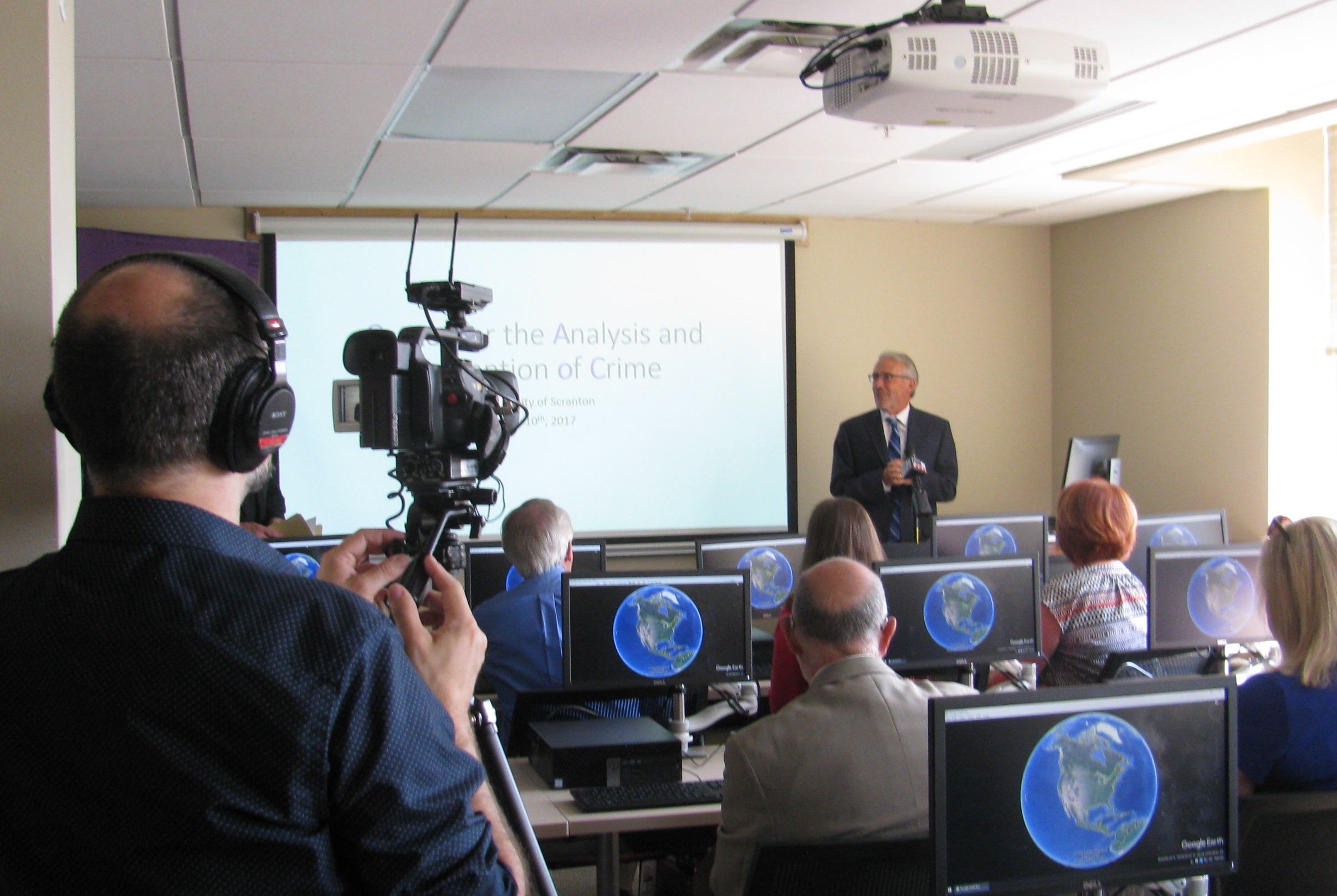University of Scranton Opens Center for the Analysis and Prevention of Crime

The University of Scranton gave community leaders a preview of its new Center for the Analysis and Prevention of Crime, which combines faculty research expertise and criminal justice practitioner knowledge with state-of-the-art technology for extensive data analysis.
The center, housed in the University’s Department of Sociology, Criminal Justice and Criminology, will provide: education, certification and professional development in the latest scientific criminal justice techniques; analysis of data using various sophisticated modeling techniques that can then be applied to more efficiently utilize resources; and evaluation of the effectiveness of programming.
“The main purpose of the center is to help criminal justice practitioners more effectively navigate the challenging criminal justice environment, while engaging students in a unique, experiential learning opportunity that also serves our greater community,” said Michael Jenkins, Ph.D., associate professor of criminal justice and executive director of the Center for the Analysis and Prevention of Crime.
“By integrating this knowledge and expertise with real life cases by working with – and learning from – our local partners, we are providing our students with the chance to make a positive impact on people’s lives.,” said Rev. Herbert B. Keller, S.J., interim president at the University.
Through the center, University students will be able to minor in crime analysis or earn a certificate in crime analysis, crime prevention or criminal investigations. Students majoring in criminal justice who meet GPA and other requirements can apply for the University’s Student Analyst Program, which will allow students to work directly with criminal justice agencies and faculty on research, data collection and analysis.
“Actually getting into our partner agencies to gather data, learning about the field from the inside, and gaining expertise in the analysis of problems that face criminal justice practitioners will set our graduates apart from students in most undergraduate programs,” said Dr. Jenkins.
According to Dr. Jenkins, University faculty have already been working individually on initiatives with several nonprofit agencies, as well as the Scranton Police Department. The center will now provide a cohesive structure and additional resources to these efforts, as well as opportunities for new collaborations.
“What we have here in the city of Scranton and Northeast PA, is probably one of the best universities in the country and, on top of that, one of the best Criminal Justice Departments in the country,” said Carl Graziano, chief of the Scranton Police Department (SPD). “That is really something we have to embrace.”
Chief Graziano said the SPD is excited to partner with the University’s criminal justice department for the center. “You have a teaching facility that not only benefits the students, it’s going to benefit so much more,” he said.
The SPD and the center have submitted a proposal for federal funding for a new initiative that would offer treatment, without arrest, to low-level drug offenders. The center would collect data and evaluate effectiveness of program.
Criminal justice professor Ismail Onat, Ph.D., chief analyst for the center, provided a demonstration of some of the data analysis capability of the center, which applies the geographic and temporal elements from crime data to project the risk of specific crimes occurring within a neighborhood block.
In another example, Dr. Onat and Dr. Jenkins examined the overlap between crime victimization and socioeconomic disadvantage.
“Maps illustrate what we also find in our statistical analysis, when broken down by the census block group, hot spots of crime victimization overlap significantly with areas of concentrated disadvantage,” said Dr. Onat.
The center will also offer professional development training for those already working in policing, corrections, private security or other related fields. The first course officially offered through the center is July 26, on the principles and importance of using evidence-based practice. It is open to anyone working with those in or affected by the criminal justice system.
The University offers a bachelor’s degree in criminal justice and minors in criminal justice and criminology. Scranton’s criminal justice program is certified by the Academy of Criminal Justice Sciences (ACJS), an international association that fosters professional and scholarly activities in the field of criminal justice. The certification is designed to evaluate evidence-based compliance that meets or exceeds all academic standards set by the ACJS executive board for associate’s, bachelor’s and master’s level criminal justice programs. The certification is based on outcome assessment of evidence of a program’s quality and effectiveness.






